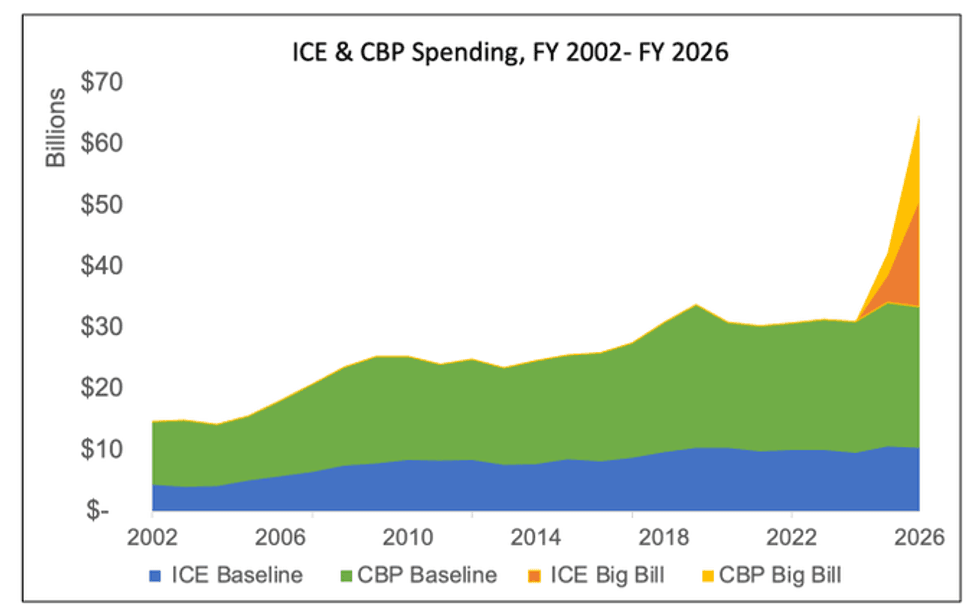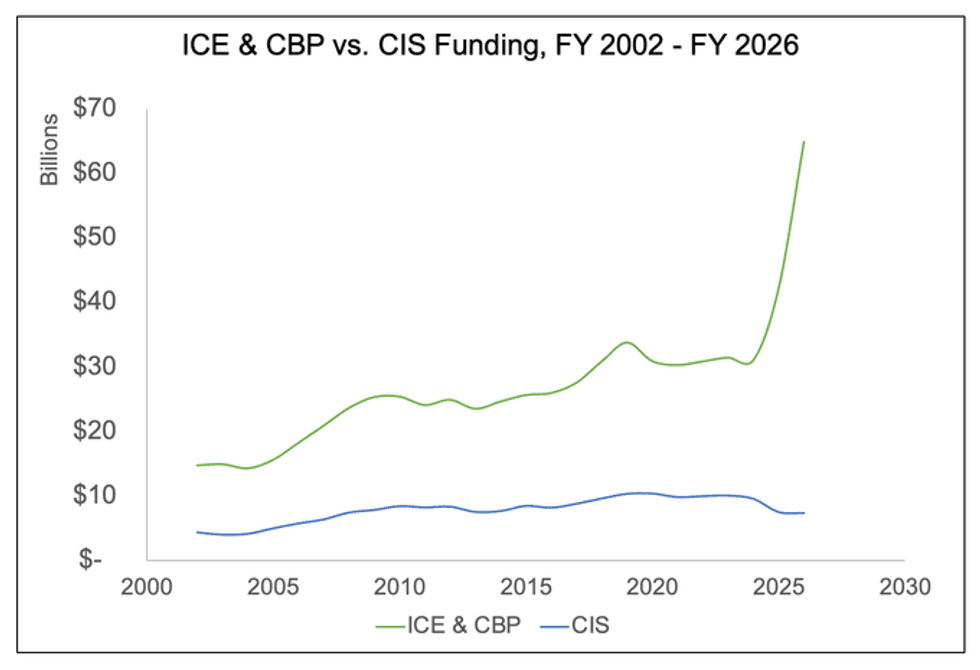

SUBSCRIBE TO OUR FREE NEWSLETTER
Daily news & progressive opinion—funded by the people, not the corporations—delivered straight to your inbox.
5
#000000
#FFFFFF
To donate by check, phone, or other method, see our More Ways to Give page.


Daily news & progressive opinion—funded by the people, not the corporations—delivered straight to your inbox.
The ICE and CBP budgets are soaring at the same time that funding for legal immigration through US Citizenship and Immigration Services would get a 23% cut.
This week, members of Congress are negotiating funding levels for Immigration and Customs Enforcement, or ICE, and Customs and Border Protection, or CBP, after public opposition soared when federal agents killed Renee Good and Alex Pretti in Minneapolis.
As of January 25, ICE held more than 70,000 people in detention, and claimed more than 352,000 deportations. In 2025, at least 32 people died in ICE custody, and so far in 2026, at least eight people have died in the custody or at the hands of ICE and CBP, including Renee Good and Alex Pretti. ICE and CBP have targeted citizens, documented immigrants, and undocumented people alike. They have targeted adults and children. ICE is now holding an average of 170 children in detention each day.
They can do all of this because ICE and CBP are flush with money from last year’s Big Ugly Bill that stripped health insurance and food assistance from Americans while padding the budgets of ICE, CBP, and the Pentagon. The bill provided $170 billion for the Trump-GOP mass deportation agenda and $156 billion for the Pentagon, to be available through September 2029. That includes nearly $75 billion for ICE and more than $58 billion for CBP.
The “regular” annual budgets for ICE and CBP totaled about $33 billion in FY 2025. If legislators funded ICE and CBP at those levels for the current year, combined with funding from the Big Bad Bill, the annual budgets for those agencies would total $64.9 billion (assuming the Big Bad Bill funds are spent equally over the 51 months they’re available). That amounts to a 92% increase over the previous highest funding level for the agencies, which was $33.8 billion in FY 2019; a 209% increase since FY 2024; and a 441% increase since the creation of ICE in FY 2002.

This doesn’t even include additional funding to support mass deportations through the Department of Defense and local law enforcement agencies.
The ICE and CBP budgets are soaring at the same time that funding for legal immigration through US Citizenship and Immigration Services (USCIS) would get a 23% cut from FY 2024 to FY 2026. And the Big Bad Bill significantly increased fees across categories of legal immigration.

The message is clear: This regime is anti-immigrant. This was never about law enforcement, or else the legal paths to immigration would remain open. Instead, budgets for legal immigration are being cut while the Trump regime strips legal status from successive groups of formerly documented immigrants.
The danger is that large numbers of legislators in both parties appear likely to approve relatively even baseline funding levels for ICE and CBP with limited procedural safeguards, while leaving the Big Bad Bill funding intact. The deaths and violence in detention centers and on our streets mean that any additional funding for ICE and CBP will only enable more violence.
"Do the right thing: Get off of corporate welfare and pay all of your workers a living wage with good benefits," the democratic socialist senator implored Walmart's multibillionaire owners.
US Sen. Bernie Sanders on Thursday launched an investigation into how corporations including Walmart—which hit $1 trillion in market value earlier this week—benefit from tax breaks in Republicans' so-called One Big Beautiful Bill Act while many of their workers can't make ends meet.
Sanders (I-Vt.) informed Walmart president and CEO Doug McMillon and the heads of Kroger, Dollar General, and Dollar Tree in separate letters that he's probing how the One Big Beautiful Bill Act (OBBBA) passed by the GOP-controlled Congress and signed by President Donald Trump last year "has negatively impacted the health and well-being of workers at large corporations... and how it has financially benefited the owners and executives of these multinational conglomerates."
"This legislation made the largest cuts to Medicaid and the Supplemental Nutrition Assistance Program (SNAP) in history to pay for $1 trillion in tax breaks to the top 1% and over $900 billion in tax cuts to large corporations," noted Sanders, the ranking member of the Senate Committee on Health, Education, Labor, and Pensions.
"As you know, Walmart is the largest corporation in America with over $680 billion in revenue, $19.4 billion in profits, and more than 2 million workers," Sanders wrote in his letter to McMillon. "Walmart also recently became the first retailer ever to hit $1 trillion in market value. It is owned by one of the wealthiest families in America, the Walton family, which has become over $348 billion richer since 2017 and is now worth more than half a trillion dollars."
"Yet, despite the enormous wealth of the Walton family and these huge corporate profits, Walmart pays wages so low that many of its workers rely on public assistance to survive," the senator said. "At Walmart, tens of thousands of low-wage workers are forced to depend on SNAP to feed their families and Medicaid to get the healthcare they need—all paid for by US taxpayers."
"Walmart pays wages so low that many of its workers rely on public assistance to survive."
Sanders is asking the heads of the companies in his probe to "disclose how much they expect to make from the Republicans’ tax breaks and whether any of these savings will be passed along to workers."
“It has never been acceptable that incredibly profitable companies like Walmart—owned by one of the richest families on Earth—pay their workers starvation wages, forcing many of them to rely on programs like Medicaid and SNAP," Sanders wrote to McMillon. "But it is even more unacceptable when those benefits are being slashed so that corporate executives and billionaires like the Walton family can become even richer.”
"Corporate consultants and vendors are getting to make a killing off of Medicaid work requirements' administration machinery while our patients will lose healthcare and suffer," said one advocate.
Three of the US Senate's top critics of corporate greed and anticompetitive behavior are investigating a scheme by credit report firm Equifax that they say will allow the company to profit from Republican policies that are set to rip away healthcare coverage and food assistance from millions of Americans.
Sens. Elizabeth Warren (D-Mass.), Ron Wyden (D-Ore.), and Bernie Sanders (I-Vt.) wrote to Equifax CEO Mark Begor on Tuesday with several questions about the company's anticipated profits from provisions in the One Big Beautiful Bill Act (OBBBA) that imposed work requirements on recipients of Medicaid and Supplemental Nutrition Assistance Program (SNAP) benefits.
Begor told investors last summer that the policy presented a "massive" business opportunity for Equifax, as a product owned by the company called the Work Number is used by many states to instantly verify the wages and work hours of Medicaid applicants.
At least 99 million workers across the country are covered by Equifax's database, which the company has filled with data through exclusive contracts with employers and payroll firms. Equifax has frequently imposed steep price hikes on the product and has been accused of having a monopoly on providing income data to state agencies.
North Carolina's Medicaid program was hit with a 24% price increase in 2022 and a 36% hike in 2024.
"We have very little leverage and recourse to back out," state Medicaid director Jay Ludlam told the New York Times in November.
Luke Farrell, a former employee of the US Digital Service under the Biden administration, told the Times that Equifax owns "a product that has become a core piece of the safety net. I’ve never seen another vendor do such price hikes across public benefits.”
With the new work requirements set to go into effect in January 2027, states will be required to check the database more frequently.
The OBBBA's $1 trillion in cuts to SNAP and Medicaid are projected to cause "over 5 million people to lose their health insurance and over 3 million people to pay higher grocery prices within the next few years," wrote the senators this week.
"But for Equifax, these new threats to Americans’ food assistance and health insurance coverage 'represent the chance to become a lot richer,'" they wrote, quoting the Times' article from November about Equifax's plan to price-gouge states.
The senators continued:
Because Equifax is already dominant in this market, the law’s new red tape requirements allow the company to consolidate power even further, using extractive contracts to price-gouge states, squeeze competitors, and drive up profits. In fact, Equifax is laying the groundwork to cash in by proactively building out a platform called “TotalVerify,” which is specifically marketed as a tool to help “Prepare Your Agency For H.R.1.” Equifax also pitched the platform as a “single-source” for states and government agencies to be able to verify employment, income, incarceration status, consumer address, and phone number history and claims to “help state and government agencies manage the complexities of SNAP and Medicaid programs.” Given that Equifax’s tight grip on this business has “border[ed] on a monopoly,” Equifax stands to gain even more as OBBBA’s red-tape requirements take effect nationwide.
The lawmakers noted that judging from history, the work requirements are unlikely to "be effective at anything but increasing red tape," as the vast majority of Medicaid and SNAP recipients who are eligible to work already do and states have already run "failed" experiments with Medicaid work requirements.
In 2018, Arkansas' program resulted in 18,000 low-income people losing coverage in under a year, with people who had no home internet access and those who qualified for an exemption from the work requirement most likely to lose their benefits.
"Now, President Trump and Republicans in Congress have expanded this policy in a move that will ensure more Americans get tangled up in red tape and lose essential healthcare coverage and food assistance as a result," wrote Warren, Wyden, and Sanders. "That these requirements could allow Equifax to profiteer off of this ‘solution’ [makes] them even more egregious."
Adam Gaffney, former president of Physicians for a National Health Program, summarized the senators' objections to Equifax's price-gouging practices: "Corporate consultants and vendors are getting to make a killing off of Medicaid work requirements' administration machinery while our patients will lose healthcare and suffer. Meanwhile taxpayers will fund the bureaucratic lard."
The senators demanded to know Equifax's per-query costs for each state contract for the Work Number, the number of OBBBA-related contracts it expects to bid for in 2026 and 2027, the company's lobbying expenditures over the past five years for federal, state, and local governments, and whether Equifax plans to retain a clause in its contracts that allows it the “categorical right” to change prices with 30 days’ notice.
"Equifax’s long history of anti-competitive behavior," said the senators, "raises serious concerns about the company’s potential moves to price gouge states and taxpayers."